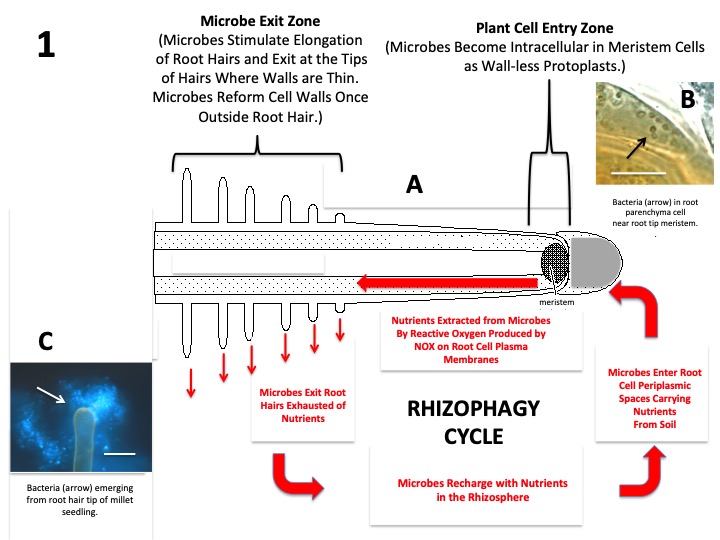- Endophytes
- Plant Microbiome
- Beneficial Microbes
- Plant Nutrients
- Rhizophagy Cycle
Basic Information

(Dec 1958–)
Location: Leavenworth, Kansas, USA
1. Brief Introduction
Dr. James F. White, Jr. is Professor of Plant Biology at Rutgers University where he, students and collaborators conduct research on beneficial and endophytic microbes that inhabit plant cells and tissues. Dr. White obtained the Ph.D. in Botany/Mycology from the University of Texas, Austin. Dr. White is the author of more than 350 articles and book chapters, and author and editor of reference books on the biology of endophytes, including Biotechnology of Acremonium Endophytes of Grasses (1994), Microbial Endophytes (2000), The Clavicipitalean Fungi (2004), The Fungal Community: Its Organization and Role in the Ecosystem (2005, 2017), Defensive Mutualism in Microbial Symbiosis (2009), and Seed Endophytes: Biology and Biotechnology (2019). Dr. White is a fellow of the AAAS, and Associate Editor for journals Fungal Ecology, Symbiosis, Mycoscience, and Scientific Reports, and also serves on the editorial boards of MDPI journals Biology and Microorganisms. Dr. White serves as the Chief Editor for the Plant-Microbes Interactions section of journal Microorganisms. Dr. White and collaborators helped to develop much of what is currently known regarding the 'rhizophagy cycle'. The rhizophagy cycle is a nutrient acquisition process in plant roots where plants internalize microbes and extract nutrients from them.
2. Educational Experience
James F. White, Jr. was born in Leavenworth, Kansas December 26, 1958. Dr. White obtained the B.S. and M.S. in Botany and Plant Pathology, respectively at Auburn University in Alabama where he specialized in mycology, studying with Dr. Gareth Morgan-Jones. He obtained the Ph.D. in Botany/Mycology (Dissertation topic = 'Biology of Endophytic Fungi') from the University of Texas, Austin in 1987 where he was advised by Dr. Richard Starr. After a post-doc at Ohio State University working on fossil fungi with Dr. Thomas Taylor, he joined the faculty of Auburn University in Montgomery, Alabama in1988 where he taught courses in Botany, Ecology and Mycology. In 1995 Dr. White joined the faculty of Rutgers University in the Department of Plant Biology, where he teaches courses in Mycology, and he, students and collaborators conduct research on beneficial microbes (endophytes) that inhabit plant tissues.
3. Achievements and Career Development
James White is the author of more than 350 articles and book chapters (Google Scholar H-Index = 67; publications cited more that 19,000 times; ResearchGate Research Interest Score greater than 99% of researchers), and author and editor of reference books on the biology of endophytes, including Biotechnology of Acremonium Endophytes of Grasses (1994), Microbial Endophytes (2000), The Clavicipitalean Fungi (2004), The Fungal Community: Its Organization and Role in the Ecosystem (2005, 2017), Defensive Mutualism in Microbial Symbiosis (2009), and Seed Endophytes: Biology and Biotechnology (2019). Dr. White served as the founding Secretary of the International Symbiosis Society (ISS) from 1992-1995, playing a key role in establishing the ISS. Dr. White was awarded the distinguished researcher award at Auburn University Montgomery in 1994, and the Constantine Alexopoulos Prize by the Mycological Society of America in 1996 for his research on endophytic fungi. Dr. White is a fellow (elected in 2005) of the American Association for the Advancement of Science (AAAS), and Associate Editor for journals Fungal Ecology, Symbiosis, Mycoscience, and Scientific Reports, and also serves on the editorial boards of MDPI journals Biology and Microorganisms. Dr. White serves as the Chief Editor for the Plant-Microbes Interactions section of journal Microorganisms. Dr. White and collaborators helped to develop much of what is currently known regarding the 'rhizophagy cycle' (Figure 1).[1] The rhizophagy cycle is a nutrient acquisition process in plant roots where plants internalize microbes and extract nutrients from them. James White is a frequent invited speaker on the topic of the rhizophagy cycle at conferences and workshops on plant microbiome applications and regenerative agriculture. In 2017, he and students published a hypothesis (Endoparasitism Driven Eukaryogenesis)[2] that holds that bacterial endoparasitism into archaeans drove early evolution of eukaryotic cells. A Triassic fossil fungus genus 'Jimwhitea' was named by Drs. Michael Krings and Thomas Taylor in recognition of the work that he did in the area of fossil fungi early in his career.[3] Recent research has also focused on the mechanisms by which plants extract nuctrients from diazotrophic microbes that are absorbed into cells of leaves and inflorescences of plants.[4]
Fig. 1A-C. Diagrammatic representation of the rhizophagy cycle. 1A. Diagram of the rhizophagy cycle showing microbes entering root cells at the root tip meristem and exiting root cells at the tips of elongating root hairs. Rhizophagy cycle microbes alternate between an intracellular endophytic phase and a free-living soils phase; soil nutrients are acquired in the free-living soil phase and extracted oxidatively in the intracellular endophytic phase. 1B. Shows bacteria (arrow) in the periplasmic space of parenchyma cell near root tip meristem of an Agave sp. seedling (bar = 20 µm; stained with DAB followed by aniline blue). 1C. Bacteria (arrow) emerging from root hair tip of grass seedling (bar = 20 µm; stained with fluorsent nucleic stain SYTO 9).[2]
References
- James F. White; Kathryn L. Kingsley; Satish K. Verma; Kurt P. Kowalski; Rhizophagy Cycle: An Oxidative Process in Plants for Nutrient Extraction from Symbiotic Microbes. Microorganisms 2018, 6, 95, 10.3390/microorganisms6030095.
- James F. White; Kathryn Kingsley; Carla J. Harper; Satish K. Verma; Lara Brindisi; Qiang Chen; Xiaoqian Chang; April Micci; Marshall Bergen; Reactive Oxygen Defense Against Cellular Endoparasites and the Origin of Eukaryotes. null 2018, 1, 439-460, 10.1016/b978-0-12-813012-4.00018-8.
- Michael Krings; Thomas N. Taylor; Nora Dotzler; Gianna Persichini; Fossil fungi with suggested affinities to the Endogonaceae from the Middle Triassic of Antarctica. Mycologia 2012, 104, 835-844, 10.3852/11-384.
- April Micci; Qiuwei Zhang; Xiaoqian Chang; Kathryn Kingsley; Linsey Park; Peerapol Chiaranunt; RaquelE Strickland; Fernando Velazquez; Sean Lindert; Matthew Elmore; et al. Histochemical Evidence for Nitrogen-Transfer Endosymbiosis in Non-Photosynthetic Cells of Leaves and Inflorescence Bracts of Angiosperms. Biology 2022, 11, 876, 10.3390/biology11060876.

